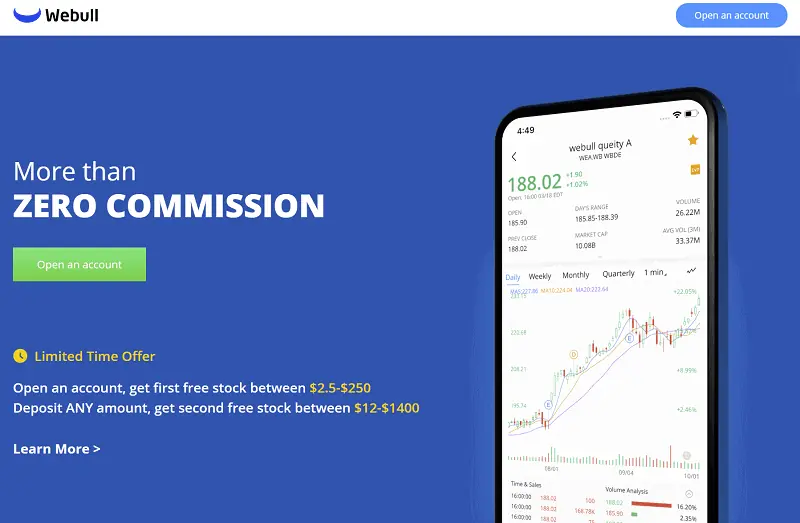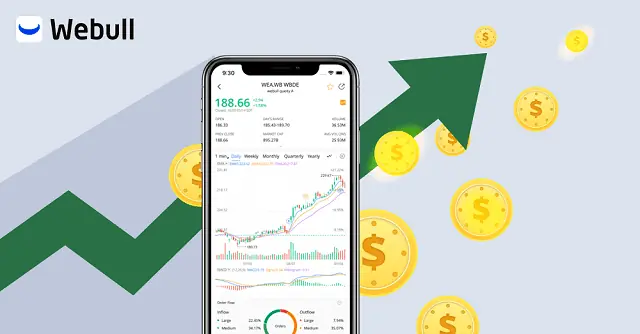In college I looked at my trading account with a discount broker and thought it was great because I only had to pay $7 for each trade. I made some mistakes when I first started by losing some money on some poor trades.
I remember thinking at least I did not overpay on my trading commissions.
It has become increasingly difficult to make money within the traditional brokerage system. Many chose to compete based on commission price, first dropping to below $5 and then eventually to nothing when Robinhood joined the fray.
This discount brokerage changed the game by charging $0 for trading commissions—unheard of at the time. Now? Table stakes.
Then, in 2018, another discount brokerage, Webull, threw its hat in the ring.
Webull follows a similar model as Robinhood and made me wonder, “How does Webull make money?”
This post examines how Webull makes money- a free stock investing app which has gained significant favor with Millennials.
How Does Webull Make Money?
With the popularity of commission-free investing apps for beginners – including Webull’s offerings – you might wonder how these companies are still able to generate income without charging a fee each time you buy or sell.
Each of the discount brokerages available to investors offer slightly different and nuanced services, so their revenue streams will vary slightly. Though, they effectively earn money through other avenues and services.
Most even still manage to market themselves by giving away free bonuses for sign up. Learn how to get free stocks for creating an account (and depositing at least $100 in the case of Webull).
Webull has found a way to remove trading commissions for their users and can afford this in part by having lower operating costs without physical offices. Further, Webull makes money by:
1. Paid subscriptions.
Webull offers Level 2 Advance Quotes on Nasdaq for $1.99/mo compared to Robinhood’s $5/mo Robinhood Gold membership providing the same benefit.
Webull’s Level 2 Advance product allows for institutional traders to see the order-flow for a trade before it gets executed. Level 2 Quotes provide traders with access to more than 90% of the information on a specific stock.
This is high-level information that providers like Robinhood do not offer and can be beneficial for serious traders who want to see how their orders are being processed before they execute an order or make any trades.
Paid subscriptions give Webull revenue which offsets some of its operating costs, but also increases user experience in terms of accessing institutional grade data feeds.
Webull’s Level II Advance product allows for investors to get access to big players’ trading activity without having to pay exorbitant fees if they were using brokerages with physical offices.
2. Payment for Order Flow: Rebates and Discounts from Designated Market Makers.
Webull earns a considerable amount of its revenue through monetizing their order flow, or from receiving rebates from market makers and trading venues.
By monetizing the trading activity of its investors, Webull can make money without having to charge a commission when these investors place trades.
Webull charges market makers and trading venues for order flow, which is the amount of securities that are traded from one investor’s account to another in a single second.
For every $100 worth of transactions Webull executes on behalf of their clients, they earn $0.01 for payment-for-order-flow or “rebates.”
This means Webull can offset its commissions by monetizing an individual client’s order flow with rebates charged back to other brokers, even with penny stocks on Webull.
Webull is funded primarily by deals for order flow. Each time a user places an order on their investing platform, that order goes to a designated market maker (DMM). In turn, this DMM rewards Webull for sending its trades to it.
The DMM makes profit by charging what many market participants refer to as the “bid-ask spread” or turn. This represents the difference between quoted prices investors are willing to buy (ask) or sell (bid) on an instantaneous basis.
Trades execute algorithmically, allowing the DMM to balance market supply with demand and facilitate thousands of trades for potentially millions of shares in real-time.
DMM’s can make money by regularly being able to make better offers on bid and ask prices. This competitiveness allows them to compete against other stock exchanges (such as the NASDAQ).
In the case of Webull, it works with the Apex Clearing Corporation to settle the transactions placed by their users.
For directing their order flow to Apex Clearing, Webull then receives a fraction of the DMM’s profit afforded through making more attractive (i.e., narrower) bid-ask spreads.
While seemingly small on an individual trade basis, Webull can quickly earn millions of dollars in revenue by routing many millions of trades through its platform’s users.
Therefore, Webull wants to grow its user base to be as large as possible so it can monetize their order flow and turn a profit.
This seems innocuous for placid market times, but in events like we saw in early 2021 with GameStop, AMC Theaters, Express Outfitters and other famous brands of yesteryear, the market frenzy caused Webull, Robinhood and other alternatives to fail to keep up.
Many traders were unaware of the cost of free trades, because these brokers monetized order flow payments and were told they could not place orders in these securities.
The same system applies for the Webull Crypto service and seeking to increase trading volume from users.
The process is hard to understand because it can take a long time to process. There are a lot of trades but they happen automatically.
As a second fault for this practice, retail traders may not always receive the best available price for their stock trades. Given the automatic nature of the settlement process, your order may not execute at the price you chose.
Finally, the massive volume of trading activity that can occur during any given market moment might allow for DMMs to heavily influence market activity, leading to market volatility and rapid price movements.
Therefore, this practice, while lucrative for Webull, can result in substantial blowback and unwanted outcomes for retail investors.
3. Lending out securities and cash held by their investors.
Webull earns money on your idle investments and cash. It does so by lending these assets out to other traders when you leave them in your account.
When a broker lends out securities, they earn interest from the borrowing counterparty. Webull lends stocks in their investors’ accounts to other traders on margin.
The way Webull does much of its business is by providing trading assistance to clients, including filling orders and lending shares out when needed. When lending shares to other traders interested in shorting stocks on Webull, the platform earns interest.
It offers to share this with investors in exchange for their ability to borrow your shares.
After the initiating investor closes the short position established through borrowing your shares, your stock returns to your Webull account while the company nets the interest income.
Likewise, the same occurs with cash as Webull can sweep this into a bank account to earn interest on your idle cash on a daily basis.
4. Margin fees and interest.
Webull offers investors margin loans to any account with at least $2,000 in equity holdings. Depending on the balance held with the firm, you can receive differentiated interest rates.
By taking advantage of margin loans, Webull can lend you money and earn interest on your loan for the duration outstanding.
5. Short selling fees and interest.

Because Webull allows short selling for its investors, the broker has an additional revenue opportunity it can capture from lending out investors’ shares to interested short sellers. Webull earns interest from borrowers who wish to sell its investors’ shares short.
| Debit Balance | Annual Margin Rate |
|---|---|
| $0 - $25,000 | 6.99% |
| $25,000.01 - $100,000 | 6.49% |
| $100,000.01 - $250,000 | 5.99% |
| $250,000.01 - $500,000 | 5.49% |
| $500,000.01 - $1,000,000 | 4.99% |
| $1,000,000.01 - $3,000,000 | 4.49% |
| $3,000,000.01+ | 3.99% |
6. Other fees related to account management.
Webull also charges fees related to domestic and international wire fees, among other administrative services.
Webull does not appear to charge a fee for using ACH deposits and withdrawals, making it the preferred method for depositing or withdrawing cash from the broker.
Webull does not currently have a Cash Management-equivalent program like Robinhood’s high interest account, but it does still make money off similar products and services.
- Webull is a low-cost trading and investing app that allows you to invest in stocks, ETFs, options, and crypto, and participate in initial public offerings (IPOs). Webull has also expanded its U.S. offerings to include futures and commodities trading.
- Commission-free trades on stocks, ETFs, and options.
- Trading features include charting tools, technical indicators, customizable screeners, real-time stock alerts, and group orders.
- Let Webull manage your money for you with Webull Smart Advisor, which combines Webull's in-house investment expertise and artificial intelligence to build, manage, and rebalance an ETF portfolio for you.
- New users also get one free month of Nasdaq TotalView's Level 2 Quotes service. (That subscription costs $2.99/mo. thereafter.)
- Sign up for Webull Cash Management to earn a 5.0% APY without fees or minimums.
- Special offer: Open an account and deposit at least $500 to receive 20 free fractional shares, collectively worth between $60-$90,000.*
- Good selection of available investments
- Fractional shares
- Powerful technical analysis tools
- Offers robo-advisory services
- Accessible to beginning and intermediate users
- Voice commands
- Offers highly competitive APY through Webull Cash Management
- Does not support mutual funds
Related:









